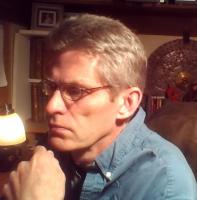Anthem
The room smells of fear, sweat and urine, and as the indio goes on, I scowl at his ruddy face and try to forget the guerilla in the Petén jungle who ruined my leg so long ago. He too was dirty, conniving and disloyal, and he too stared at me with dark, inscrutable eyes. He begged for his life with the same puling, illiterate accent and, unable to stand it anymore, I hit the table with my palm and growl, “What makes you think I care about the ricachón’s granddaughter, you shumo aguambado?”
“Nothing, sir,” sputters the indio. “It’s just . . . when he mentioned she was starting primary school, I thought—”
“Did I ask what you thought?”
“No, sir, I—”
“Then why are you doing this? You’ve been with him for almost two weeks. Do you really expect us to believe he hasn’t said anything of value?”
“I’m sorry, sir. I’m doing everything you told me to. He just won’t—”
“Bullshit,” I mutter. “You’re lying. We both know it. And one of these days . . . Ah, enough of this. Arcelio! ¡Vonós! Help me take this piece of shit back to his cell.”
My fellow guard steps from the corner and hauls the traitor to his feet and once again, I mumble how none of these indios can be trusted. Eventually, we will have to find another tactic to get what we want and as I follow them out, I squeeze the handle of my baton and pray we have not wasted too much time on this scheme. I pray my superiors will not regret using this criminal because in the end, it will be the innocent who suffer. It will be their bodies strewn across the calles, their blood drenching the avenidas. I know this because I was there on the fifth of September and I have seen firsthand the pain these terrorists cause and the disorder in which they thrive. I saw the car bombs detonate outside the Palacio Nacional and I watched the smoke plumes of oil and gasoline pour into the sky. I smelled the burning flesh and heard the wails of misery and for hour after endless hour, I stood helpless and impotent.
For most of my life, my nation had been fighting but to me, those years of conflict were nothing but images on a television screen. I was a student and a civilian then and I too was ignorant and ambivalent. My thoughts were the selfish ones of a child but amid the wreckage of that day, amid the blare of sirens and the stench of death, I saw our flag standing above the Plaza de la Constitución. It was covered in soot, its edges were tattered but under the flap of its soiled colors, I saw the truth and understood what had to be done, what sacrifices had to be made.
We advance past checkpoints and down corridors and I find an uneasy sense of disquiet growing within me. The air is thick, the light is dim and, confined by mute echoes, I feel the shadows pacing just beyond the edges of my vision like they once did in the jungle. Within the cells, bodies shamble in the darkness, conversations are mouthed unheard and I move up behind the indio as he attempts to make himself crumpled and small. He is trying to seem injured, to seem harmless. He thinks he is fooling us, thinks we are all naive and when we stop in front of his cell, he turns and looks at me. He nods and tries to smile and I picture him cheering before his television on that day in September. I imagine him dancing and laughing at the remains of shredded women and babies, and I squeeze the baton even tighter.

J. Paul Ross is a graduate of Metropolitan State University of Denver and a Pushcart Prize and Best of the Net nominee. His fiction has appeared in numerous online and in print magazines and journals including, 34 Orchard, The Antioch Review, The Bacopa Literary Review and Fiction International. Currently, he is working on a novel set along the Pan-American Highway. J. Paul recommends Amnesty International.


